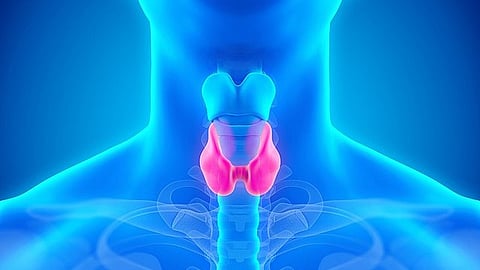Management:
It's improbable for acute emergencies related to the thyroid to occur during dental procedures. Immediate management is supportive when loss of consciousness occurs.
Hypothyroid patients are unusually sensitive to the following drugs:
Effective management can be achieved through oral administration of desiccated thyroid hormone. Therapy is continued in the patient’s remaining life. The patient returns to normal body weight within 30 days of the start of therapy. Symptoms of hypothyroidism include:
Weakness
Fatigue
Cold intolerance
Puffy skin
Thick tongue
Step 1: Termination of dental procedure
Step 2: The patient is placed supine with the legs elevated slightly.
Step 3: (Circulation- Airway- Breathing), Basic life support: Management includes the assessment of circulation, establishment of a patent airway, assessment of breathing, and the administration of oxygen.
Step 4: (definitive care)
Step 4a: When the patient does not regain consciousness after the implementation of BLS, medical assistance should be sought out immediately.
Step 4b: Establishment of an intravenous (IV) line: An IV infusion of 5% dextrose and water, lactated Ringers solution, or normal saline can be started before the arrival of emergency personnel.
Step 4c: Administration of oxygen
Step 4d: Definitive management includes admitting the patient to the emergency department, intravenous administration of appropriate doses of thyroid hormones, and the reversal of hypothermia.
Conclusion:
Understanding the ramifications of thyroid gland dysfunction is paramount in dentistry. Thyroid disorders can present in various oral health issues, impacting the oral mucosa, periodontal tissues, and salivary glands. Dentists hold a pivotal role in recognizing potential signs and symptoms of thyroid dysfunction during routine examinations, facilitating early identification and referral for suitable medical intervention. Collaborative efforts between dental professionals and endocrinologists are imperative to deliver comprehensive care to patients with thyroid disorders, ensuring optimal oral health and overall well-being. By keeping abreast of the intricate connections between thyroid health and oral health, dental practitioners can actively contribute to their patients' holistic care and enhance health outcomes.
References:
Pyle MA, Faddoul FF, Terezhalmy GT. Clinical implications of drugs taken by our patients. Dent Clin North Am. 1993;37:73–90. [PubMed] [Google Scholar]
Klein I. Thyroid hormone and the cardiovascular system. Am J Med. 1990;88:631–7. [PubMed] [Google Scholar]
(By Anjali KV)
SB


